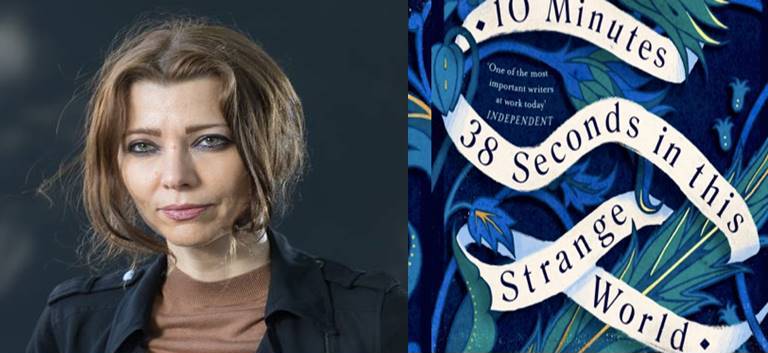In her new novel 10 Minutes 38 Seconds in This Strange World, Turkish author Elif Shafak takes us to the world of a sex worker from Istanbul. A theme that has been persistent across all her novels and runs through her present work too, is the social violence and discrimination against women and the erosion of secularism in Turkey.
Elif Shafak has been under attack by the Turkish government as she has written vehemently about the victims of sexual violence in Turkey in a profound yet extremely disturbing narrative.
The book begins with an extremely provocative and explosive premise where the reader is allowed entry into the mind of the protagonist – a Turkish sex worker called Tequilla Leila, who is dying in pain in a garbage bin on the outskirts of Turkey.
As she is breathing her last, she is recalling how she led her life as a sex worker and how her life was not always meant to be full of such extreme pain and anguish.
“ She recalled things she did not even know she was capable of remembering, things she had believed to be lost forever. Time became fluid, a free flow of recollections seeping into one another, the past and the present inseparable.”
This is the story of a completely shattered but courageous woman. She is also a woman whose life has been completely destroyed by her vocation and she has seen the worst side of humanity but even in her last moments she continues to retain her faith in human possibilities.
As she is lying helpless in a dustbin, she is recalling her childhood days and how she grew up in a household where severe restrictions were imposed on her.
Leila has gone through every kind of human trauma and has been oppressed along with her helpless mother under the boots of a ruthlessly patriarchal social order.
Leila is exposed to rampant child abuse from an intimate family member and the trauma lingers on.
She goes on to become a prostitute, suffers abjections of all kind and gets short-lived moments of happiness through her marriage. She is murdered by a rightest zealot and dumped in a dustbin.
The book is a recollection of her life in the last 10 minuets and 38 seconds, that she undertakes in her final moments. Leila is dead as a result of societal brutality but even in her last moments she did not allow them to dehumanise her.
Her struggles in childhood brought her to the dream city of ‘Istanbul’ where she aspired to find love and fulfil her dreams. But the myth of Istanbul crashed and she discovered that life would be harsh and mean to her.
Shafak describes the hostilities and cruelties inherent in the metropolis and simultaneously introduces us to another set of characters who are central to the plot. These are Leila’s five friends, and they are as ‘undesirable’ in the social milieu as is Leila herself.
Shafak poignantly narrates the piercing and unflinching trauma that women’s bodies and minds are subjected to in a social milieu governed by hard core patriarchy.
The book may appear crude and often brutal in its description of the violence the women undergo. Shafak’s work is an example of nuanced and intricate storytelling and profound messaging. The last section of the book is especially engaging where she talks about Leila lying as a corpse and being driven away by her friends from the ‘cemetery of the companionless’.
Shafak stands up for extremely brave and courageous portrayals of abuse and brutality and this indeed is a commendable commentary of a tabooed subject.
Subjecting Shafak to state-led hostilities and curbing the readership of her work will only go on to show the deepest insecurities of the state.
When one reads Shafak’s works, one does realise that as one of the most compassionate writers of our times, she is lending a voice to the marginalised.
Being Turkey’s most widely read female author, she does not fail to surprise us with her nuanced storytelling skills. Here is a novel that gives voice to the invisible, to those whom the society has shunned to the margins and Shafak narrates their painful story to her readers, while retaining literary imagination and artistic sensibility.













